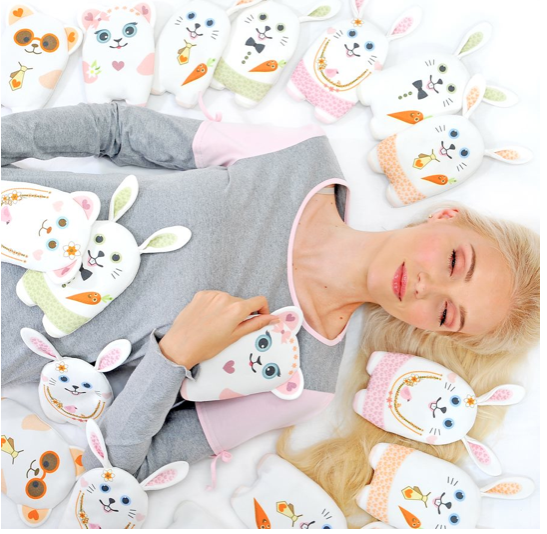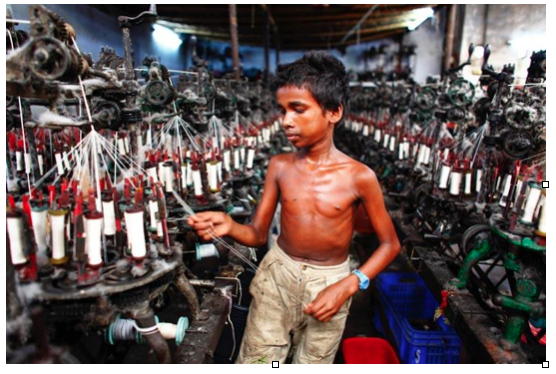Toxic Fashion and Modern Human Slavery:
Avoiding Common Toxic Elements and Standing Against Modern Slavery in Fashion Today
According to a recent Greenpeace report, hazardous chemicals are endemic in many well-known clothing brands today, regardless of price point. The study analyzed clothing and shoes from brands including H&M, Gap, Disney, Nike, Puma, American Apparel and Burberry, and found toxins that can cause hormonal disruptions, reduced immunity and allergic reactions. The study found that toxic chemicals were just as present in children’s clothing as in adult lines, especially frightening as children are most susceptible to the kind of damage caused by these chemicals given the critical developmental stages they go through, that will impact them for the rest of their lives.
6 years ago, after working in the Manhattan advertising world for 13 years, I joined an advertising company in Germany that was branding and promoting some of the brands examined in the Greenpeace study. We sent a team of video makers to shoot how these clothes are made, thinking we could include some of the video material into our new ad. Instead of making an ad, they ended up created a documentary.
At first, the video team was not allowed to go inside at all. They saw young kids running out the back. When allowed inside, they found women with masks, some extremely young, sitting on dilapidated chairs in a building barely standing under its own weight. Working without proper light, without readily available toilets, sweating in stale, chemical-filled air, one worker said she works 14 – 16 hours per day and receives 3$ per day, younger ones even less. The team learned there is a room with toddlers doing simple tasks sitting on the floor, hidden in the dark. They are forced to work and live this way because there have no other means to survive.
In Asia, human and animal rights are virtually non-existent, and western corporations abuse this fact while we – western consumers – buy the cheap yet toxic clothes, toys, shoes and home products resulting from these conditions, harming our own economy, environment and ourselves.
A good example of how bad things are is the recent collapse of one typical sweat shop in Bangladesh that killed almost 900 people. In Cambodia many women took to the streets to protest their work situations but when police killed 4 women in response without any mercy, their situation just got worse.
In Uzbekistan children are forced to leave schools when the cotton harvest season (not organic) comes, their hands end up covered in burns and the impact on the environment is horrible due to the pesticides, herbicides and insecticides they spray on cotton globally.
http://www.greenpeace.org/international/en/press/releases/New-study-finds-toxic-monsters-lurking-in-childrens-clothing1/
http://www.dailymail.co.uk/news/article-2321843/Benetton-admits-clothes-illegal-Bangladesh-factory-collapsed-killing-900-workers.html
http://saigoneer.com/asia-news/3753-video-new-reality-puts-fashion-bloggers-to-work-in-a-cambodian-sweatshop
http://www.antislavery.org/english/slavery_today/forced_labour/forced_labour_in_uzbek_cotton_industry/default.aspx
Everything we put on our skin, our body’s biggest organ, comes into our blood stream in 6 minutes. Just consider all the anti-smoking, contraceptive and pain killing medical patches which use the skin as the delivery method. Of course we are all different, but the skin of an infant or a child is extremely sensitive.
There are very few regulations regarding what kind of colors (most contain heavy metals), easy ironing treatment, anti-wrinkle substances, glues and chemicals can be applied to textiles that are used for clothing, shoes or home products. Before items are transported across long distances, they are sprayed with even more chemicals so rodents, bugs and microorganisms do not destroy the goods by the time they get to us.
How to protect our family and not support these injustices with our daily purchases? Just like with food and cosmetics, arm yourself with knowledge:
- Read labels, research materials; where do the items you buy come from?
- Do they smell weird? Does only being in the store gives you a headache?
- Try and look for products that are GOTS and/or fair trade certified and support local small shops
- Wash everything before use with natural detergents (that will remove some of the toxins, although sadly not all)
- Get second-hand clothing from a friend for your baby even, but definitely shop quality over quantity.
Studies have shown that people who are compulsive shoppers and buy a lot of cheap products spend more money long-term then people who think about their purchases and buy high quality, organic, fair trade products and shop less compulsively. We as people are generally well-intentioned individuals that would never support these cruelties if we would know about them – so do your research! Sadly, just because these injustices happen in Asia, far away from us, does not mean they do not exist. These are not isolated cases but rather a norm in many parts of the industry.
When I first began to learn about this 5 years ago, I felt helpless at first, and then a huge textile factory in my birth country Slovenia went bankrupt and 4,000 people lost their jobs, mostly women. Slovene people turned (a few years after entering EU) from people who purchase what they truly need into a nation driven by consumerism, hurting the economy that was previously more ethical, eco-friendly and quality focused. I wanted to do something about it. I began by identifying textile suppliers that have all the certificates for their textiles and also transparency in their processes and treatment of employees. I created the project BeeZee EcoKid (now BeeZee EcoLand) that combines all of my talents, ethical convictions, experience and knowledge into one (www.beezeeecoland.com/2015.pdf). I wanted to create a small lifestyle brand that will is ethical (fair trade, cruelty free to people and animals, helping single mothers from my birth town in Slovenia), healthy (organic, natural, safe colors, hypoallergenic, comfortable) and sustainable in every way (eco-friendly processes, recycling). We have received 3 EU awards so far: SEA award for the most sustainable company in EU, the best green designer Modepalast in Austria and 10 best eco designers in Germany. We have fans like David Garrett, Chris Evans and Alicia Silverstone.

It is a small, low-profit project but my personal big attempt to make this world a better place. We offer free bespoke services (we are small and versatile). I also create custom-made illustrations (we can print them on clothes, bedding) with unique names or messages of positive energy. It is challenging to be honest and do good nowadays, when people are so accustomed to cheap, hyper-colorful products promoted so aggressively, but I am trying to spread awareness, empower young mothers, and share the truth while creating ethical, unique, beautiful and healthy items that also help talented women in need of work from my birth town. Compassion is practical and if we are not going to protect our families, nobody will.
By Bianca Z. Morris

Thank you for this post. Been fighting modern human slavery 5 years now and sharing the truth gives us power to make a change globally. Our planet is small and we need to make sure future generations live better in more humane and less violent world.